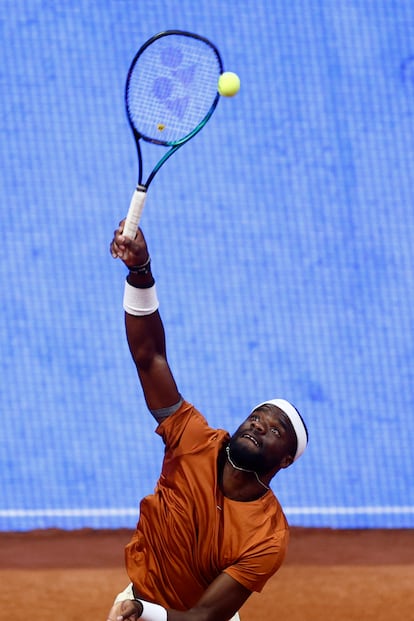Frances Tiafoe: ‘Being Black in America is crazy’
The world number 11 spoke to EL PAÍS about breaking down barriers in tennis, his greatest inspirations, his rise in the sport and expectations over becoming a Grand Slam champion

At the end of the corridor, Frances Tiafoe appears with a laid-back gait. As the American tennis player approaches, his body gains volume and his back widens until he becomes a closet. The 25-year-old weighs 86 kilos and stands 1.88 meters tall. The handshake prior to the interview could crush a brick. Big Foe, as he is known, wears a hooded sweatshirt and falls plumb on the stool. “I like Madrid, yeah,” he says with a wink before delving into his roots and his story, which is not the sort of tale you might normally expect from a professional tennis player. The son of a miner and a Sierra Leonean nurse fleeing the civil war, he found inspiration at the Maryland tennis club his father had helped to build and where he was subsequently employed as a caretaker. For years, Tiafoe lived, slept and dreamed there. But he did it: a Black player making his way in a traditionally white sport.
Question. Very few Black players have succeeded in tennis. How difficult has it been to get here?
Answer. I think it’s great and I think obviously Serena and Venus [Williams] had a lot to do with that; There have been so many great players since then and who looked up to them and want to be like them. On the men’s side we had Arthur Ashe [the first black man to win a major, in 1968], Mal Washington obviously, Yannick Noah, James Blake, guys like that. I just want to be in that list of names. On the girls’ side, outside of Serena and Venus, there was Lori McNeil, Zina Garrison Chanda Rubin, there’s been a lot of players and there’s always been someone who paved the way before you do it. It means much more, people of color doing something in the game of tennis, which is normally a white sport, you know mostly called a country club kind of sport, I think we broke the mold, we’ve got other people to be more involved in sport and to follow the sport.
“I think there’s a misconception of ‘oh, you grew up so tough, you didn’t have this...’ Well, I had the game of tennis, and it never let me down”
Q. Your parents worked very hard. What have you learned from them?
A. That hard work is everything. Put the work in, commit to it; dedicate yourself to it and believe in yourself, believe you can really achieve anything you want. It’s just a matter of almost being obsessed and, you know, taking note.
Q. You have good memories of your childhood, but it wasn’t easy...
A. Yeah, but you’re kids, you don’t know if it’s hard or not, right? I think there’s a misconception of ‘oh, you grew up so tough, you didn’t have this...’ Well, I had the game of tennis you know, and it never let me down. It took me a lot of places. I was able to do a lot of special things. I was able to have fun as a kid, I loved playing tennis, I loved competing against people, I loved being around other kids, so I never really felt bad for my situation. I guess I wanted to be at the end or in the middle, kind of knowing that I took advantage of the whole thing.
Q. What were those nights sleeping in the office with your father like?
A. I remember it like it was yesterday, sleeping on the massage table with my twin brother and sleeping on my dad’s bed when he was working through the night. I remember all of that and I take a lot of pride in that, I take a lot of confidence and when I’m competing I go there, I remember those tough moments, where I came from and stuff like that. Everything I’ve achieved I’ve worked for.

Q. What do you think about the situation for Black people in the USA?
A. It’s crazy, man; I mean, being Black in America is crazy: It’s all been going on for a long time, it’s sad, I mean little kids getting shot, shootings going on everywhere. Things have got to change in the states, gun violence needs to be changed. People need to come together. Driving while being Black can be a thing, you know? Things need to change, it starts from the top. Obviously, racism is something that we need to overcome.
Q Do you consider yourself a social activist?
A. Absolutely, absolutely, I think we all play our part and I stand by people all the time because we really go through it in this country. But it’s so much bigger.
Q. Who inspired you more, people like Nelson Mandela, Martin Luther King, Malcolm X...
A. All of those guys, even Arthur Ashe, during Apartheid it was crazy what he was doing. There have been a lot of influential Black people, Barack Obama, Michelle Obama for that matter too. It’s been amazing to see the road of so many great activists and what they’ve been able to do.
Q. You were born in the United States, but your heart is in Sierra Leone, right?
A. I went once when I was about seven or eight, a long time ago. I want to go again at the end of this year or next year, just kind of just be there and take it all in and see how people take me in. And I think it’ll be a lot of fun.
“I feel like I’ve got three legitimate chances every year, at the Australian Open, Wimbledon, the U.S. Open... the French Open is always going to be a tough one for me”
Q. The USA has been waiting for a Grand Slam champion for many years. Do you feel that weight of responsibility?
A. I think I’m in a position now with the influence of lessons in my life. I know what I can do, I know what I’m capable of, and I believe I can do it. I feel like I’ve got three legitimate chances every year, at the Australian Open, Wimbledon, the U.S. Open... the French Open is always going to be a tough one for me. But yeah, I’m ready to take on all challengers and I’m really excited about these next 10 or so years. I can compete against the best players in the world, I can beat the best players in the world, I have, now it’s a matter of doing it when it counts, over two weeks and back-to-back.
Q. Can anyone stop Carlos Alcaraz?
A. Man, he’s crazy. But yeah, we saw Sinner beat him in Miami, obviously I played five sets with him last summer [in the U.S. Open semifinals], but he’s tough, you guys should be so excited for that guy and so happy for that guy, he’s going to have a career as one to remember. He’s a great guy, for how young he is and how he’s handling everything, it’s great to be a part of it and see his rise and see everything he’s going to accomplish. I’m just happy for him, his team and for his country, Spain. He’s going to be special for a long time.
Q. How would you like to be remembered? What kind of message would you like to leave when you retire?
A. I’d like to be known as a good person first, a guy who gave a lot to the game, who’s been impactful, not only to the game but to family and to the country they love, Sierra Leone. I don’t really want to be known as a great tennis player, there are a going to be a lot of great tennis players, there are a lot of great tennis players now, after me, before me. I think the tennis is going to speak for itself but I want to be known for the person I was.
Sign up for our weekly newsletter to get more English-language news coverage from EL PAÍS USA Edition
Tu suscripción se está usando en otro dispositivo
¿Quieres añadir otro usuario a tu suscripción?
Si continúas leyendo en este dispositivo, no se podrá leer en el otro.
FlechaTu suscripción se está usando en otro dispositivo y solo puedes acceder a EL PAÍS desde un dispositivo a la vez.
Si quieres compartir tu cuenta, cambia tu suscripción a la modalidad Premium, así podrás añadir otro usuario. Cada uno accederá con su propia cuenta de email, lo que os permitirá personalizar vuestra experiencia en EL PAÍS.
¿Tienes una suscripción de empresa? Accede aquí para contratar más cuentas.
En el caso de no saber quién está usando tu cuenta, te recomendamos cambiar tu contraseña aquí.
Si decides continuar compartiendo tu cuenta, este mensaje se mostrará en tu dispositivo y en el de la otra persona que está usando tu cuenta de forma indefinida, afectando a tu experiencia de lectura. Puedes consultar aquí los términos y condiciones de la suscripción digital.








































